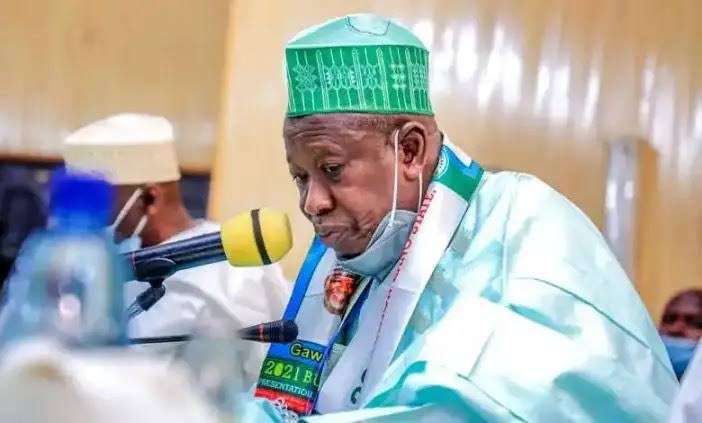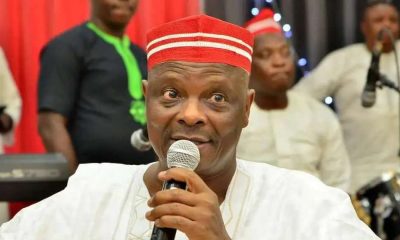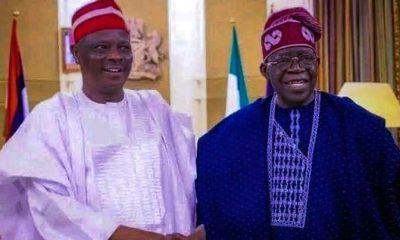Politics
Kano: Ganduje battles Kwankwaso on APC return

– President Tinubu in dilemma over loyalty against votes
Kano, Nigeria’s largest voting bloc and most volatile theater of political rivalry, is once again in the national spotlight. The spark this time is the renewed speculation whether Senator Rabiu Musa Kwankwaso, former governor of the state, and national leader of the New Nigeria People’s Party (NNPP), will make a dramatic return to the All Progressives Congress (APC) ahead of the 2027 elections.
Kwankwaso, who has oscillated between political platforms in his long career, set tongues wagging last week when he told a delegation of APC grassroots members led by Hon. Buhari Bakwana, a former adviser to ex-governor Abdullahi Umar Ganduje, that his movement was “ready to join APC under strong conditions and promises.”
“We will not allow anyone to use us and later dump us,” Kwankwaso said pointedly. “Discussions about a merger, or return, to APC must spell out tangible benefits for my party (NNPP).”
The remarks, coming only days after his close ally and federal lawmaker, Hon. Abdulmumin Jibrin, declared on Channels TV that Kwankwaso was on his way back to the APC, reignited feverish debate over Kano’s political future. Jibrin was swiftly suspended by the NNPP’s Kano State leadership for “selling out the movement,” but the genie was already out of the bottle.
By Friday, reports emerged that Kwankwaso had formally submitted a letter of intent to the APC. But the former governor moved quickly to quash the story.
“We have been alerted to some online statements suggesting that we have submitted a letter of intent to join a political party in the country,” Kwankwaso wrote in a post on X. “We would like to clarify that we have not made any such submission to any party. The public is, therefore, advised to stay informed through our official channels.”
Yet, the clarifications have not stilled the storm. Instead, the rumor mill has fed a deeper drama, one that exposes the enduring enmity between Kwankwaso and his former deputy and successor, Ganduje, now a key ally of President Bola Tinubu, who Business Hallmark gathered, is working hard to shut APC door in front of his former political mentor.
Ganduje spits fire
If there were doubts about Ganduje’s position, they were laid to rest at a stakeholders’ meeting of APC leaders in Kano last week. In a scathing address, the former governor, and former APC National chairman, lampooned his estranged mentor, reminding party loyalists that Kwankwaso had once dismissed the APC as a “party for madmen” and ridiculed Tinubu himself.
“We too have heard these rumors, but we don’t take them seriously,” Ganduje said in an interview with BBC Hausa Service monitored in Kaduna.
“Kwankwaso once said only a madman would join APC. He even mocked President Tinubu, claiming he only developed Lagos. Now they want to return. If they come, we’ll welcome them as madmen, who swallowed their vomit.”
The imagery was as brutal as it was deliberate. For Ganduje, who still controls much of the APC structure in Kano, Kwankwaso’s return would not just be a political embarrassment; it would represent a hostile takeover that could relegate him to the sidelines.
The former governor did allow that reconciliation among Kano’s three surviving political giants – himself, Kwankwaso and Ibrahim Shekarau, could one day be possible. “We all have governance experience that can benefit the state,” he said. But the broader message was clear: Kwankwaso is not welcome.
Ganduje also launched into a stinging critique of Gov. Abba Kabir Yusuf, Kwankwaso’s protege in Government House. He accused the NNPP administration of vendetta and wasteful despite unprecedented federal allocations.
“This government has no grip on governance. It’s like comparing a messenger with a permanent secretary. Theirs is a government of vendetta and banditry, clumsy and confused. They spend recklessly on projects without value for money,” he thundered.
APC shuts the door
Ganduje is not alone. The Kano APC, which is essentially under his control, has formally dismissed the possibility of ceding ground to Kwankwaso. Party spokesman, Ahmed Aruwa, told Arewa PUNCH that no one in APC begged the NNPP leader to return, let alone under conditions.
“The conditions we are hearing, that our governorship ticket should be handed over to him, or his candidate, are totally unacceptable,” Aruwa declared. “The APC already has strong aspirants, Senator Barau Jibrin, Dr. Nasiru Yusuf Gawuna, and A.A Zaura, among others. There is no vacancy for Kwankwaso’s conditions.”
It is a blunt reminder of the deep distrust between both camps. For APC loyalists in Kano, accepting Kwankwaso could mean losing the structures they fought to build.
NNPP rallies around leader
Inside the NNPP, however, the debate has exposed not only rifts, but also revealed how central Kwankwaso remains.
Ajuji Ahmed, national chairman of the party, down-played suggestions of defection in an interview with Arise TV. “I don’t think Kwankwaso is defecting, and I don’t think that what he said in any way indicated that,” he argued.
“We have three options. One is what he referred to, engaging APC if they invite us. Another is to go into a coalition with any party that shares our philosophy. The third is to go it alone. These options are still on the table.”
The NNPP’s national publicity secretary, Ladipo Johnson, was more forceful. He revealed that Jibrin’s Channels TV interview had sparked outrage within the party for suggesting a fait accompli.
“The party has always said we are open to work with other parties — APC, ADC, even Peter Obi, or former President Goodluck Jonathan,” Johnson said on Arise recently.
“But we haven’t taken a position yet. It was shocking that just after our NEC meeting, where Kwankwaso clarified that we are fine with what we have but open to discussions, Jibrin went on air and made statements that undermined the leader and the party.”
According to Johnson, Jibrin’s suspension was a necessary show of discipline. “There is no sacred cow. Kwankwaso may be his benefactor, but this is a team game. If you want the party to go in a particular direction, you must wait for consensus. The Kano chapter simply had to send a message.”
Kabir Dakata, director general of the Kano Signage and Advertisement Agency, echoed the same sentiment. “The exit of Abdulmumin Jibrin demonstrates discipline in the party,” he said. “Instead of doing what he was sent to do, he was negotiating the defection of the party and the Kwankwasiyya movement to APC. He was trying to sell the entire movement. Kwankwaso has only said his doors are open, which shows he is a man of the people.”
Tinubu’s Kano dilemma
Beyond the barbs, the episode has laid bare a more complicated reality for President Tinubu. In the 2023 elections, the NNPP swept Kano with over one million votes, leaving APC bruised despite its national dominance. For 2027, Kano’s massive electoral weight – second only to Lagos in terms of voter register, yet turns out more votes – is non-negotiable.
Tinubu, it was gathered has privately courted Kwankwaso before, even exploring the possibility of a cabinet role for the former defence minister last year. But standing firmly in the way is Ganduje, the President’s close ally and political confidant.
For Tinubu, the calculus is difficult. Allowing Kwankwaso into the APC could deliver Kano’s votes, but risk alienating Ganduje. Keeping Ganduje happy could mean losing Kwankwaso’s grassroots machinery, the formidable Kwankwasiyya movement that has defined Kano politics for nearly two decades.
“Tinubu needs Kwankwaso to secure Kano votes in 2027,” said Anthony Chidi, a lawyer and political analyst. “But Ganduje, his loyalist, is the major stumbling block. It’s a classic clash between electoral necessity and political loyalty.”
Old wounds, new stakes
The ferocity of the current exchanges cannot be understood without revisiting the long history of acrimony between Ganduje and Kwankwaso. Once allies, their relationship collapsed after 2015, when Ganduje, then Kwankwaso’s deputy, broke free to build his own political fiefdom.
Since then, Kano has witnessed a relentless duel: red caps of the Kwankwasiyya versus white caps of the Gandujiyya. The rivalry has not only shaped state politics but also influenced national alignments. Now, as Nigeria hurtles toward 2027, that battle is being reprised on a grander stage.
What next for Kwankwaso?
Despite the denials, few in Kano believe Kwankwaso has abandoned the option of returning to APC. His statement that “we are ready to join APC under strong conditions” continues to reverberate.
Political insiders suggest that he sees the ruling party as his best chance to regain national relevance.
For all its rhetoric, the NNPP remains a fringe party, its strength largely confined to Kano and Jigawa, and few parts of the North-West. A merger, or return to APC, could thrust Kwankwaso back into the center of national politics, and perhaps, into Tinubu’s 2027 calculations.
Yet for now, Ganduje has drawn a red line. “Anyone who wants to join is welcome,” he said last week, “but they must follow due process. If they return, we’ll welcome them, but we will name it for what it is: they’ve vomited and now they’re licking it back.”
Due process for Ganduje is understood to essentially mean accepting his leadership of the party in the state, a scenario Kwankwaso, who is known to have huge ego, is unlikely to accept. The renewed supremacy battle in Kano is a struggle over the control of Nigeria’s most strategic political fortress outside Lagos, one that could decide the outcome of 2027.
Kwankwaso may yet play his cards cautiously, keeping options open between APC, coalition talks with other opposition forces, and holding onto his NNPP base. Ganduje, meanwhile, is determined to deny him the keys to the APC house.
Caught in between is President Tinubu, whose political survival could hinge on resolving this combustible equation. Whether he chooses Ganduje, or Kwankwaso, or finds a way to accommodate both, will shape not just Kano’s destiny but Nigeria’s next electoral cycle.
For now, one thing is clear: Kano’s political cauldron is boiling once again, and the echoes of its supremacy battle are reverberating far beyond the ancient city’s walls.









